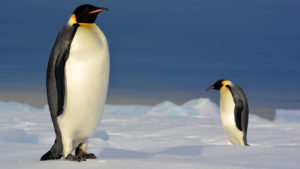
Scientists are concerned that as climate change progresses, emperor penguins may not find enough food to build up enough body fat to stay warm during the winter when they remain in a colony (without foraging for food) to incubate their eggs. © Fabien Petit/IPEV/CNRS/CSM
WOODS HOLE – Diminishing sea ice in the Antarctic means less fish to eat for Emperor penguins and a big question facing scientists is how the birds will hold up in the face of climate change.
Researchers at the Woods Hole Oceanographic Institution have developed a way to help determine the hunting success of Emperor penguins by using time-lapse video observations relayed to scientists thousands of miles away.
The new approach detailed in a recent issue of “Journal of Applied Physics” is a viable way to determine the foraging success of the penguins by taking pictures of their behavior once they return back to the colony from hunting trips.
Emperor’s tend to be the biggest eaters out of all of the penguin species and make up to 75 mile treks during the winter on foraging trips.
But as sea ice diminishes so does the plankton living underneath which serves as the primary food source for the fish that the penguins eat. The ice also serves as a resting platform for the penguins in between dives.
Studying the Emperor penguins, who have a position at the top of the food web, is useful for understanding the predicted impact of global changes on the polar marine biome.
More information on the study can be found here.
























